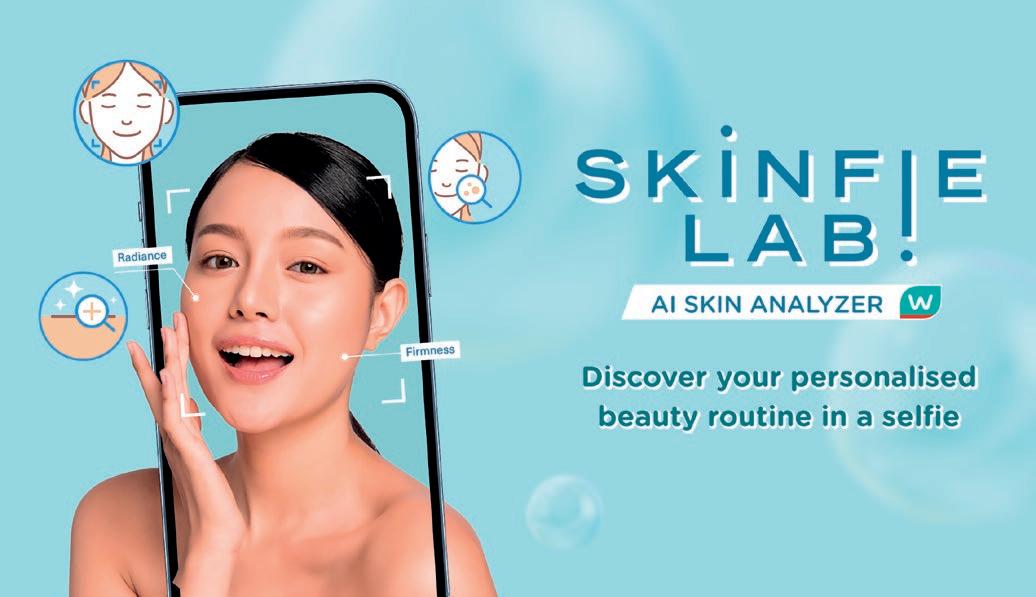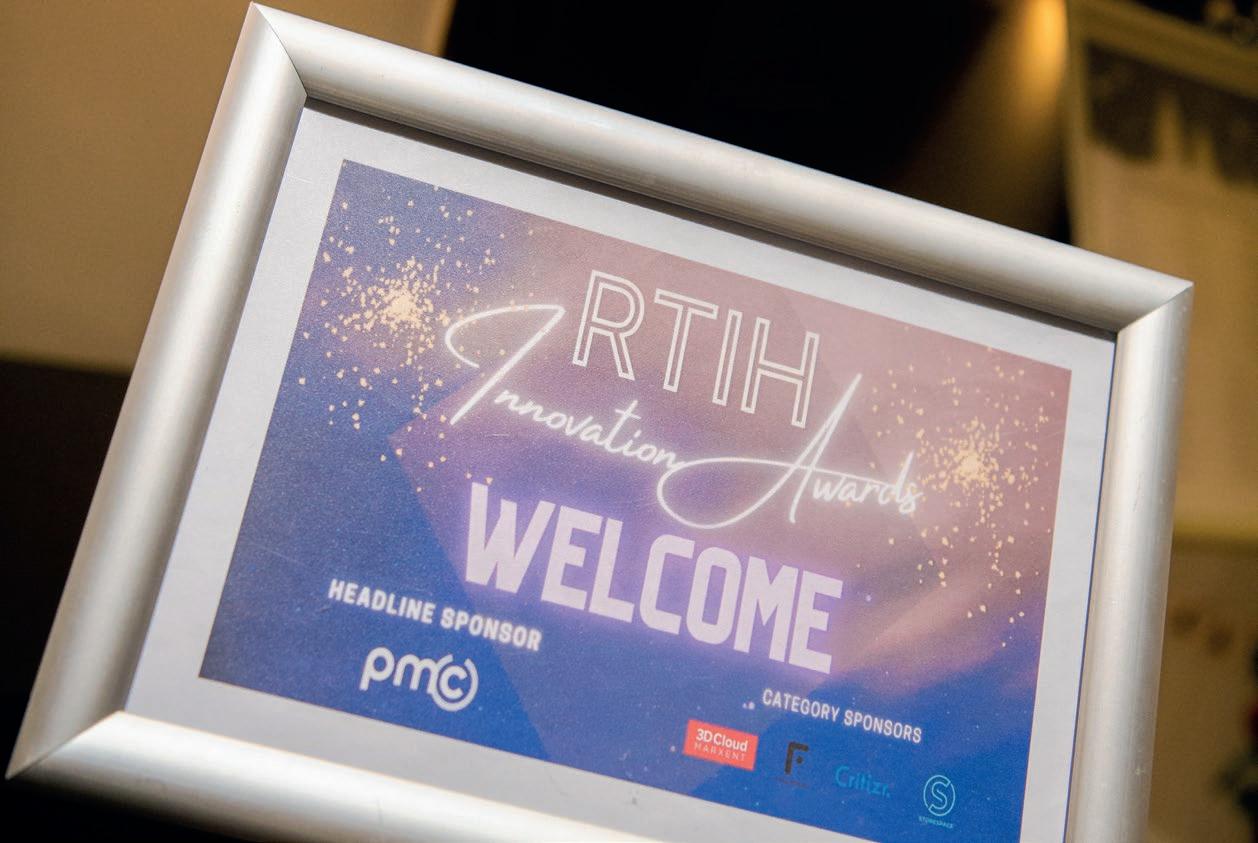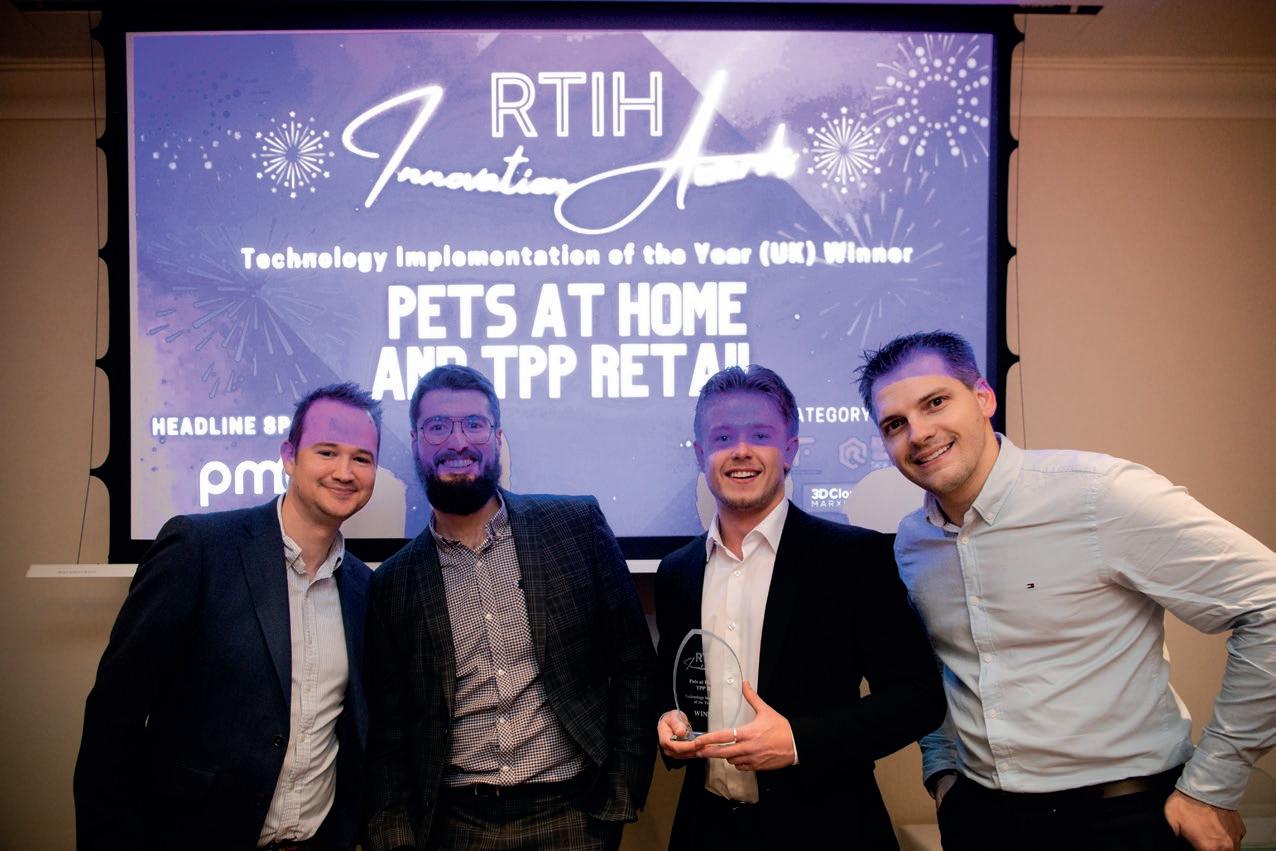

Key features





Key features


ISSUE
February – April 2023
EDITOR AND FOUNDER
Scott Thompson
Tel: 07528 807353
Email: scott.thompson@retailtechinnovationhub.com
Website: www.retailtechinnovationhub.com

Twitter: www.twitter.com/RTIH_RetailTech

PRINTED BY The Manson Group
8 Porters Wood Valley Road Industrial Estate
St Albans
AL3 6PZ
UK
Tel: 0800 118 2871
Email: enquiries@mansongroup.co.uk
GRAPHIC DESIGN
Steve Kelly
Concept Graphics
Tel: 07734 264835
Email: steve@conceptstudio.co.uk
© 2023 RTIH

Ilaunched RTIH (as those into the whole brevity thing like to call it) in 2017 and it is now a leading website for the global omnichannel retail technology community.
So it was with great excitement that, in 2022, I introduced to you RTIH in magazine format and, in the process, connected with even more retail tech buyers, suppliers and enthusiasts.
Within these pages, you will find a review of the 2022 RTIH Innovation Awards, along with the first ever RTIH Retail Technology Innovations Report, sponsored by Metapack.
Now into their fourth year, the awards, sponsored by PMC, 3D Cloud by Marxent, FreedomPay, CADS, and Critizr, celebrate global tech innovation in a fast moving omnichannel world.
We received a record number of submissions across 14 categories in 2022. Our winners and highly commended companies were announced during a sold out event that took place in central London during December and was attended by retailers, tech suppliers, members of our judging panel, and sponsors.
The RTIH Retail Technology Innovations Report, meanwhile, highlights the top 50 retail tech plays of 2022 as decided by myself and an independent advisory panel.
We were looking for groundbreaking technology deployments, launches, and pilots from across the omnichannel retail landscape, be they payments, supply chain, online, mobile, physical store etc related.
And we have produced a cracking top 50, if I say so myself!
I will shortly start work on the next edition of RTIH magazine. A bumper offering, this will be distributed at both Retail Technology Show (taking place from 26th-27th April at Olympia, London) and Shoptalk Europe (taking place from 9th-11th May in Barcelona). There will be advertisement and promotional article opportunities within the magazine.

Don’t miss your chance to be a part of our biggest edition of the year. Contact me at the email address below for further details.
Scott Thompson Editor & Founder, RTIH scott.thompson@retailtechinnovationhub.com
RTIH is pleased to announce the launch of its first ever Retail Technology Innovations Report, sponsored by Metapack.
This highlights the top 50 retail tech plays of 2022 as decided by myself and an independent advisory panel.
We were looking for groundbreaking technology deployments, launches, and pilots from across the omnichannel retail landscape, be they payments, supply chain, online, mobile, physical store etc related.
I produced a longlist which went to the judging panel, consisting of:
Mike Cadden, Technology and Business Transformation Director, Start-Rite Shoes
Matt Taylor, Technology Transformation Leader at EY, Retail and Consumer Products
Brittain Ladd, Supply Chain, Logistics, Operations, and Strategy Executive
Imran Ansani, Head of Retail Edge Solutions and Ecosystems, Dell Technologies
Christine Russo, Retail Industry Analyst
Gary Newbury, Supply Chain Advisor and Delivery Executive
Toby Pickard, Global Insight Leader, IGD
They picked their stand out retail technology plays of 2022, put forward their own favourite innovations, and, based on this, I drew up the final 50.
Innovation and technology play a critical role in the success of the retail sector, and it is great to celebrate this with the 2022 Retail Technology Innovations Report.
Many thanks to Metapack, a leading provider of e-commerce delivery management technology to enterprise retailers and brands, for sponsoring it.
Scott Thompson - Editor and Founder, RTIHOur judging panel said: “This category is an area absolutely ripe for innovation and will bring benefits across retail. With returns being such a hot topic, and the perfect storm of ESG, rising returns costs and yet the cost-of-living crisis meaning that retail costs have to come down, mechanisms to reduce cost, help ESG programmes and lower returns rates are currently massively in demand.
With the recent upgrades to mobile technology this space is going to become even bigger. Unfortunately, though, in fashion retail fit is only one element and there will naturally be, and rightly, a scepticism around whether the fit applications will thoroughly


work. Beyond fit, and especially with regards to the likes of Victoria’s Secret, style, design and materials will play into this and continue to be as big an issue. Across apparel this will be an issue.
For large purchases, such as where the Kingfisher concept comes in, then the ability to visualise large purchases in-situ whilst being able to touch and feel product in-store will be the large winner in the 3D category for now. Here there is a real customer centric win.”
In November, Coach went live with a 3D technology powered extension of its Courage to Be Real campaign on the Piccadilly Lights in Piccadilly Circus, London.
Piccadilly Lights, the largest advertising display in Europe, ran this for 24 hours a day, from 7th - 13th November, with an hourly 3D full screen takeover featuring Coach brand ambassador, Lil Nas X. This saw the rapper move through doors that represent the struggles he has faced in life, from fear, self-doubt, to judgment from others. The sequence concluded with Lil Nas X looking over Piccadilly Circus whilst performing.
Tech enabled in-store shopping solutions provide visitors with seamless payment options, personalised styling recommendations, faster checkout, and upgraded delivery/ return options.
The 3D category is an area absolutely ripe for innovation and will bring benefits across retail.
Victoria’s Secret & Co. is rolling out new technology to help customers find the right size when shopping on the brand’s app for Victoria’s Secret and Victoria’s Secret Pink bras.
In partnership with NetVirta, the creator of Verifyt, customers will be able to leverage 3D scan technology to receive personalised bra size recommendations.
3D Cloud by Marxent is partnering with Kingfisher to roll-out new 3D visualisation, planning, and design tech across a number of its banners.
The initiative includes a 3D kitchen, bathroom, and storage planner with virtual reality capabilities in addition to a series of mobile 3D product configurators. Kingfisher’s B&Q and Brico Depot Romania have already launched the system in the UK, Republic of Ireland and Romania. B&Q UK has also rolled out a line-up of intuitive, mobile first 3D product configurators for fireplaces and for the Kingfisher exclusive Atomia and Alara product lines.
Using the aforementioned tools, shoppers are able to explore, design, visualise and checkout in a single app. More sophisticated design features are available for experienced designers.
Volumental’s 3D foot scanners help consumers find the perfect fitting shoes in the styles they want, going beyond length and
width measurements by using computer vision, purchase data and AI that has “learned” from some 34 million 3D foot scans to recommend the optimal sizes, brands and styles for each customer.
The tech matches an individual’s foot scans to those of others with the same foot shape who have successfully purchased a particular size and style in the past.
More than 80 brands, including Under Armour, Hoka, New Balance, and Red Wing Shoes, have implemented Volumental’s technology in 3,000 stores.
A.S. Watson has taken the wraps off Skinfie Lab, a tool that creates personalised skincare product recommendations based on customers’ selfies.
This is making its debut at Watsons Hong Kong and will be rolled out to Thailand, Taiwan, the Philippines, Singapore, Malaysia, and Indonesia by early 2023. It builds on the launch of an AI powered skincare advisor at Superdrug in the UK.
Our judging panel said: “The metaverse is a long-term play. With the cost-of-living crisis and many retailers having excess stock and having to focus on pure cash generation as well as massive transformation, the metaverse will continue to be a niche play in 2023 for most.
That is reflected in many of the highlighted tech plays. In the main, the metaverse will continue to be a tool to build
long-term communities, to build loyalty through accessing unique, interactive content that would not be available in the real world – certainly without expensive VIP access.
The Forever 21 technology is very interesting; younger game players will see nothing unusual about spending large amounts on clothing for their online avatars in a way that the older generations will not understand. Trialling product in the metaverse, such as on Roblox for the consumer to wear then releasing the popular products, is a brilliant way of building engagement, loyalty and also trialling product in a live environment. This will be a new world for most merch teams but will become far more common.”
Carrefour has partnered with Procter & Gamble for what is pitched as “the first joint retail/ FMCG brand experience in the metaverse”.
This involves the latter’s Mr. Clean brand. In a LinkedIn post, Elodie Perthuisot, Chief E Commerce, Digital Transformation and Data Officer & EXCOM member at Carrefour, said: “Thanks to their Lab, we are both offering Carrefour customers a marketing activation of a new style, between
With the cost-of-living crisis and many retailers having excess stock and having to focus on pure cash generation as well as massive transformation, the metaverse will continue to be a niche play in 2023 for most


gamification, immersion, Web3, all with a Mr. Clean as you have never seen it before.”
She added: “This is a test to renew the classic advertisements and activations, create a link between the metaverse and e-commerce, and especially receive feedback from our customers to evolve this experience.”
Obsess has launched Branded Avatars, technology enabling brands to customise the look and feel and character style of shopper avatars to create branded metaverse experiences on their e-commerce sites.
This then lets shoppers personalise all aspects of their branded avatar, including skin tone, facial features, body shape, clothing and makeup.
Charlotte Tilbury is the first brand to partner with Obsess to offer the new functionality, introducing it as part of its Charlotte’s Beauty Realm holiday wonderland.
As part of Metaverse Fashion Week, Selfridges unveiled a virtual department store in Decentraland, joining more than 70 brands, artists and designers in creating “a new experience at the intersection of fashion and technology’
In a LinkedIn post, Selfridges said: “For the first time, you’ll be able to view the exclusive UNIVERSE NFTs by Paco Rabanne and Fondation Vasarely in-situ in our flagship metaverse store.”
It added: “This is the first meta department store in the history of Web3 and anybody can visit. Interact as a guest or attach your crypto wallet to access all features, while keeping your in-world progress and digital assets safe.”
Forever 21 has launched the F21 Metaverse Collection, the retailer’s first metaverse inspired fashion collection, to mark its first year on Roblox.

This is available in stores and online and features hoodies and T-shirts, designed with elements from the brand’s virtual offerings and includes the real-life version of the Forever Beanie, the number one selling item in Forever 21 Shop City on Roblox.
In September, Alibaba Group’s Tmall Luxury Pavilion platform hosted an augmented reality fashion show and introduced a Meta Pass, which confers priority digital access to brands’ products. In recent years, the platform has deployed 3D shopping, augmented reality and virtual reality try-ons for products, digital
avatars and digital collectibles.
Also during September in Shanghai, luxury executives attended an awards ceremony and explored an exhibition on extended reality.
“Before metaverse became a buzzword, we had already transformed this buzzword into a commercial reality,” said Janet Wang, Head of Alibaba’s luxury division.
Our judging panel said: “The storms affecting retail over the last few years will drive significant innovation within the green tech world. Few of these innovations are really, at a
technology level, all that exciting, but for me anyway, the use of standard, normal technology to solve real human, real societal problems is highly exciting.
There are a number of food waste apps, with a number of local community distribution mechanisms now popping up. Apps like OLIO have allowed individuals to setup community “foodbanks” that deliver to the food poor. In this space we are
The storms affecting retail over the last few years will drive significant innovation within the green tech world.
seeing where the technology becomes secondary and the community wins by making use of it in an innovative way.
What is exciting and more innovative about some of these solutions is the amount of work that has been done in the background to create real-time capabilities. Many retailers, especially the larger legacy retailers, will have batch systems so the hidden work to deliver real-time will have been difficult.
The circular economy piece is also very interesting, but becoming somewhat saturated, with Vinted leading the way but all major e-commerce providers getting in on the
idea. This will continue to grow but will be interesting to see it combine with retailers building communities and also loyalty programmes around returns.”
The Co-op and Microsoft Caboodle platform is now live in all of the former’s 2,600 food stores across the UK. Created with technology consultancy BJSS and Team ITG, the not-for-profit digital solution enables UK supermarkets, cafés and restaurants to connect with community groups and volunteers to redistribute surplus food.
It is built on Microsoft’s Power Platform technology.
PrettyLittleThing has announced the launch of PrettyLittleThing Marketplace, an app which allows people to sell on clothes they no longer wear, or shop for something new to them.
PLT Marketing Director, Nicki Capstick, says: “We know now more than ever that our customers are more conscious of how they shop.”
“Therefore, we wanted to be the first fashion brand to launch a resale site with the ability to integrate the customers’
Emperia announced the launch of Lacoste’s first ever virtual store ahead of the 2022 holiday season.

previous PLT purchases into their wardrobe as well as creating new listings and selling items from other brands. We’re encouraging our customers to recycle and resell unwanted garments whilst making money in return.”

Our judging panel said: “This is a category I’m really unsure about at the moment. What I do know is that it will boom at some point, but right now it’s a solution without a problem to fix.
Take the Starbucks solution. Do people really care enough about Starbucks to want to spend loyalty points on digital NFTs? To purchase/swap for digital experiences, Starbucks is a coffee shop and a very good one. Maybe this is a US focused consumer thing and doesn’t translate to the UK.”
Emperia announced the launch of Lacoste’s first ever virtual store ahead of the 2022 holiday season.
Upon entering the experience, customers were taken through a crocodile’s mouth, where they found themselves in a showroom featuring five seasonal products, all shoppable viewed in 360°.
As users continued their journey into the second
room, Emperia developed a gamification feature that enabled them to interact with more products in the Christmas range. A third and final token gated room was nestled at the end of the store, exclusive to VIP customers in UNDW3 (Lacoste’s Web3 community) that are in possession of a Lacoste NFT.
Throughout December, ‘loot’ boxes were dropped within this room for UNDW3 customers to collect, and five users were selected at random daily, to win a prize. Created in partnership, using Arianee’s token gated technology to bring this room to life, customers were encouraged to keep coming back for new surprises.
Starbucks has officially announced Starbucks Odyssey, the coffee chain’s first shot at building with Web3 technology. It combines the Starbucks Rewards loyalty programme with an NFT platform, allowing its customers to both earn and purchase digital assets that unlock exclusive experiences and rewards.
Starbucks brought in Adam Brotman, the architect of its Mobile Order & Pay system and the Starbucks app, to serve as a special advisor.
Now the co-founder of Forum3, a Web3 loyalty startup, Brotman’s team worked on Starbucks Odyssey alongside the retailer’s own marketing, loyalty, and technology teams.
Our judging panel said: “Reducing cost per pick and
cost to deliver, whist improving customer satisfaction (for e-commerce retailers the delivery touchpoint can often be the only actual interaction with the customer and therefore will colour the entire experience) is critical.
Front end marketplace technology is now well established but more innovative organisations are extending to provide full end to end brand services as well as full logistics. In the way that Amazon have been doing for years.”
Supply chain consultant and former Amazon executive, Brittain Ladd, recently provided a first look at an AutoStore micro fulfilment centre (MFC) installed in a H-E-B store in Plano, Texas, USA.
In a LinkedIn post, Ladd said: “I can state with no hesitation that the installed MFC is the most incredible AutoStore MFC I’ve ever seen.”
“H-E-B can legitimately claim to operate the most sophisticated and advanced grocery store in the world. Carrefour, Tesco, Majid Al Futtaim, Hy-Vee, and Amazon, need to pay close attention to what HEB is doing; especially Hy-Vee and Amazon.”
Fashinza provides an endto-end platform for fashion brands, allowing clients to meet manufacturers virtually, analyse trending designs, place bulk orders, monitor production, manage communication and more.
Customers report a 25% reduction of costs in inventory
Web3 technology will boom at some point, but right now it’s a solution without a problem to fix.
and a 20% increase in topline growth, reducing the need for sourcing managers to leave the office, the dependency on multiple middlemen, and unannounced delays. New innovations include an AI app for real-time factory floor tracking right down to quality checks and as far reaching as sourcing raw materials, and a trends tool that uses Big Data to ensure dedicated followers of fashion stay on the pulse with seasonal and style changes.
In 2022, Attabotics raised $71.7 million in Series C-1 funding. The round, which brings total funding to $165.1 million, was led by Export Development Canada with participation from Ontario Teachers’ Pension Plan Board.
The company intends to use the funds to accelerate the commercialisation of its 3D robotics warehousing solution.
Walgreens Boots Alliance plans to open 22 robot powered micro-fulfilment centres across the US to fill customers’ prescriptions.
By 2025, as much as half of the retailer’s total prescription volume could be filled at the automated hubs, says Rex Swords, Walgreens’ Group President of Centralised Services, Operations and Planning.
Robotic technology from GreyOrange will be used at
Walmart Canada’s new $118 million sortable fulfilment centre in Rocky View County, Alberta, located just outside of Calgary.
The facility will be capable of: shipping 20 million items annually from the facility to Walmart customers; storing 500,000 items to fulfil direct to home and in-store pickup orders; and designed to optimise packaging, minimise waste and reduce transportation costs.
It opened in September and is part of Walmart Canada’s $3.5 billion investment to make the online and in-store shopping experience simpler, faster and more convenient for its customers.
Currys invested over £250,000 in a fleet of robotic exoskeleton suits to help colleagues from logistics partner, GXO, work safely and efficiently through the festive period.
The suits, which are being used at Currys’ facility in Newark, will help people carry out their physical day to day tasks, with the aim of putting less pressure on their joints and muscles while lifting heavy loads.
Our judging panel said: “Amazon is a good proven example being done at scale to ease checkout friction. The interesting test is will people trust it, with the palm scan data being stored by Amazon centrally? This is unlike a smartphone where biometrics are not apparently shared from a device.
I also like Alimentation Couche-Tard - being done at
scale and, according to Mashgin, it is 400x quicker than PoS, drives efficiencies, accurate and frictionless. Easily deployed in convenience stores, rather than requiring significant fit-out.
Tech such as Amazon Go needs significant investment in store tech to make it work. Imagr answers the frictionless checkout question without potentially needing the same level of investment (although retailers will need to invest in the smart cart).
Compass and AiFi –reportedly first in food services market in UK/Europe. Innovative use of avatar to support privacy.
Amazon
Amazon One palm scanner payment technology has launched at over 65 Whole Foods stores in California.
This is the biggest roll-out to date, with stores in Malibu, Montana Avenue, Santa Monica, Los Angeles, Orange County, Sacramento, the San Francisco Bay Area, and Santa Cruz included in the initiative.
Alimentation Couche-Tard is set to deploy more than 10,000 Mashgin AI powered touchless checkout systems, branded as Smart Checkout, to over 7,000 of its Circle K and Couche-Tard stores during the next three years.
The agreement launches the global deployment of the solution, and is claimed to be one of the largest scale expansions of computer vision powered checkout technology to date.
It builds upon the deployment of Mashgin across nearly 500
Żabka Group’s Żabka Nano pop-up autonomous store is now a part of the Microsoft Industry Experience Center in Washington, USA.

Circle K locations in the US and Sweden since 2020, as well as at Couche-Tard’s retail innovation lab store on the campus of McGill University in Montreal.
Compass Group has introduced Europe’s first ever frictionless store in a workplace using AI powered computer vision technology so staff can buy items without waiting in line or stopping to scan and pay.

Using tech from AiFi, customers ‘check in’ then
wander through the store and select food. They leave with their purchases and a receipt delivered to their phone.
Computer vision cameras convert the shopper into an avatar to anonymously track, adding selected items to the virtual shopping cart. No facial recognition or biometrics are used, ensuring privacy.
Netto has been testing out a shopping cart from Imagr that scans items and handles payment, enabling shoppers to skip checkout queues.
This went live at Kirkegårdsvej in Copenhagen, and could also be found at Kongelundsvej in Copenhagen, Runevej in Aarhus, Bybuen in
Skovlunde and Virum.
The shopper’s smartphone is connected to the shopping cart via the Netto+ app. When the cart is filled with goods, these are automatically registered with the user receiving a digital receipt.
Our judging panel said: “The challenge I see with drone delivery is scaling the tech. It makes a great story, but drones will be limited in what they can realistically carry and also number of drops etc.
Obviously drone technology is improving and certainly as part of the whole convenience instant delivery space will have a place, and with the focus again on ESG, the carbon free drones will have a huge appeal.”
The challenge I see with drone delivery is scaling the tech.
Starship Technologies and Grubhub are expanding their delivery service to Baylor University and East Carolina University (ECU) in the USA.
Baylor’s 20,000 students can order delivery from more than seven eateries on campus.
Starship’s fleet of 20 robots will deliver to the majority of buildings on campus, typically within minutes, and work in conjunction with student meal plan Dining Dollars through the Grubhub app.
At ECU, another fleet of 20 robots are providing deliveries anywhere on the main campus, including College Hill.
The deliveries to ECU’s 27,000 students are made possible through Grubhub and Starship’s partnership with ECU’s food service provider, and the service can be used in conjunction with students’ meal plan that integrates with their Grubhub account.
Uber Eats has launched two autonomous delivery pilots in Los Angeles with Serve Robotics and Motional.
Both of the pilots will initially deliver food from only a few merchants. Serve’s part of the initiative will focus on shorter trips in West Hollywood. Motional’s will handle longer distance deliveries in Santa Monica.
Off the back of a pilot in Canberra, Australia, Coles Group is expanding its drone delivery programme with operator Wing to its Gold Coast customers.
It says that it is the first major supermarket to launch a store to door drone delivery concept in Australia.
Customers in the Gold Coast suburbs of Ormeau, Ormeau Hills, and Yatala will be able
to the try out the new model, directly from the Coles store at Ormeau Village Shopping Centre.
The service will gradually expand to include other nearby suburbs, delivering 500 of the most popular Coles grocery items including bread, fresh produce, convenience meals, snacks, health care items, and household essentials.
These will be delivered to customers’ home within 10 minutes on average. Coles team members will process and pack orders, and Wing staff will load the drones and oversee operation of the delivery service.
Ottonomy has announced a collaboration with Posten Norge and Holo which will see trials involving first mile delivery automation.
Posten Norge will be leveraging Ottonomy’s Ottobots for pick-ups, receiving and delivering goods for the digital
Starbucks has officially announced Starbucks Odyssey, the coffee chain’s first shot at building with Web3 technology.
Ottonomy has announced a collaboration with Posten Norge and Holo which will see trials involving first mile delivery automation.


marketplace AMOI from the Aker Brygge metropolitan area in Oslo.
Our judging panel said: “Autonomous stores have now been around for a few years (I feel we’ve been judging these in the RTIH Innovation Awards forever) and yet actually live in the high street we’re not really seeing the penetration that the investors and the retailer trialling the technology will want.

“What I’m hearing is that the price point is too high and
therefore limiting the adoption. Until both consumer demand drives it and the ROI shows a real win, then it will continue to be a wonderful technology but of limited value in the high street. The key win is to eliminate queuing at the checkout and that’s where the consumer will see massive advantages. But given that this year the focus is on cost consciousness, then without the ability to drive down costs this space will be a year or two away from full utilisation.”
Lawson
Lawson has opened its first store staffed by on-screen avatars remotely controlled by employees.
Situated in Tokyo, it is also the retailer’s first Green Lawson store, which promotes an environmentally friendly lifestyle.
It shows shoppers an avatar on a screen, backed by a remote worker to answer queries or to process those few transactions, such as purchases of tickets, that can’t be done with selfservice tech.
Jigsaw has introduced
Mercaux’s Assisted Selling and Digital Styling solutions in a bid to connect its online and offline worlds.
The result is that store staff have been handed the digital tools to instantly check prices and stock levels while dealing with customers one-to-one and offer styling ideas in real-time for the items they’re browsing.
A planned second phase of the project will introduce a next-gen checkout giving customers the flexibility and
Autonomous stores have now been around for a few years and yet actually live in the high street we’re not really seeing the penetration that the investors and the retailer trialling the technology will want.
fluidity to use any payment method wherever and however they wish, be it in-store, online or remotely.
Everseen has announced an expanded suite of products to address the retail industry’s shrink problem.

This delivers end-to-end computer vision AI for retailers from the checkout at the front of the store, through the shopfloor, to the back of the store and beyond.
The company also announced that it has doubled its store installations, with growth driven by expansion with grocery retailers in the US, Europe, and Australia. Everseen is tapped by over half of the world’s top 15 retailers to prevent losses and its
solutions are now in use in over 6,000 major retail stores (over 80,000 PoS).
Deep North is a specialist in intelligent video analytics providing insights for physical retail comparable to data that e-commerce sellers enjoy online.
The tech gives retailers the opportunity to understand shopping behaviour, supported by cloud-based dashboards and mobile apps that provide realtime insights. What sets Deep North apart from its competitors is the ability to use existing CCTV cameras.
It helps companies improve real-time decision-making to enhance profitability, streamline operations and
increase safety, including valuable insights that improve the overall customer journey.
Spacee has launched a new version of its Deming shelf mounted robots with live video feed capabilities, allowing retail store managers to see shelves and get real-time inventory snapshots remotely.
Skip Howard, Founder and CEO at Spacee, says: “There is a huge gap between what data retailers can collect in their e-commerce operations and what they can get from physical stores.”
“Spacee helps fill that gap with critical in-store customer and supply chain data. Our latest Deming robots now take it to the next level with live and

recorded video feeds.”
The robots roam across shelves capturing inventory data. Spacee says that, while it can take several days for staff to capture inventory manually and a full day for a floor robot, Deming can provide an accurate inventory accounting of an entire facility in under a minute.
H&M Group is rolling out a pilot in COS stores, US, where “tech enabled in-store shopping solutions provide visitors with seamless payment options, personalised styling recommendations, faster checkout, and upgraded delivery/return options”.
The first pilot store in Beverly Hills, California includes fitting rooms equipped with smart mirrors that recognise products brought into the room (e.g. item, size, and colour) with the possibility to offer personalised product and styling recommendations.
On the store floor, other types of smart mirrors can be used for virtual try-on and styling.
Woolworths, in partnership with Tiliter, is introducing new artificial intelligence powered scales in produce aisles at stores across Australia.
Shoppers place their loose produce on the scales which display the weight of the product on the screen - instead of waiting until they’re at the checkout for an accurate reading.
Lowe’s is tapping NVIDIA Omniverse Enterprise to create interactive store digital twins in Mill Creek, Wash,. and Charlotte, N.C.
“We are always looking for ways to reimagine store operations and remove friction for our customers,” says Seemantini Godbole, Executive Vice President and Chief Digital and Information Officer at Lowe’s.
“With NVIDIA Omniverse, we’re pulling data together in ways that have never been possible, giving our associates superpowers.”
Sam’s Club, a division of Walmart, has announced the completion of a US, chain wide roll-out of Inventory Scan towers that have been added to its existing fleet of robotic scrubbers in partnership with Brain Corp.
The deployment was initiated in late January 2022 and has resulted in Brain Corp claiming the title of world’s leading supplier of robotic inventory scanners.
A 2022 RTIH Innovation Awards winner, Sook takes vacant retail spaces and fits them out with a modular, digital fit-out which can be rented by any occupier
by the hour.
The screens allow anyone to rapidly create a bespoke environment to showcase a product or service using digital content.
Sook maximises the utility of empty spaces with a platform that drives access for everyone (retail, amenity, community, wellness, art, meetup, education) at the same time as creating sustainable revenue for landlords.
The company gathers analytics for all its occupiers which allows them to best understand how to use physical space as efficiently and effectively as possible.
Żabka Group’s Żabka Nano pop-up autonomous store is now a part of the Microsoft Industry Experience Center in Washington, USA.
Stores operate in several formats, such as standalone container vending machines, traditional bricks and mortar outlets, or store-in-the-store. Each uses technology developed in cooperation with AiFi and leverages Microsoft Azure.
The first Żabka Nano location was established in June 2021 in Poznań. Currently, Żabka Group manages the largest chain of autonomous stores in Europe with more than 50 outlets.
Tech startup Cheeseade has launched Price Lab, its first unmanned convenience store with hourly price changes in Seoul, South Korea.
We are always looking for ways to reimagine store operations and remove friction for our customers.
The store’s artificial algorithm collects data on information that affects a product’s value, such as expiration date, remaining stock and local demand. It employs visible light communication to communicate with lights in the store, which receive hourly codified data from Cheeseade headquarters, on updates prices based on the data inputs.
Being an unmanned store, shoppers make purchases through scanning with product’s bar code with a smartphone and making the digital transaction with the phone.
Carrefour Poland, together with PepsiCo, has launched a pilot promotional programme using self-driving eRobots.
Currently, there are two
robots selling Pepsi beverages and Lay’s chips in Carrefour stores located in the Westfield Arkadia and Galeria Wileńska shopping centres in Warsaw.
The aim is to support sales and to make shoppers curious and encourage them to interact with the robots.
Sensei reports that Muffato has adopted its AI platform for what is pitched as Brazil’s first autonomous supermarket.
The Muffato Go store, which is situated in Curitiba, Paraná, comes without queues, self-scanning or any form of physical checkout, and is the first deployment of Portugalbased Sensei’s technology outside of Europe.
Shoppers download Muffato’s app, which generates a QR code

that enables them to enter the store, pick up their items and leave. A network of sensors provides the input Sensei’s AI needs to keep track of the items each customer selects and returns throughout the 250 square metre location.
This money saving and rewards app works in-store, in-app and socially to connect shoppers to brands at local convenience stores in the UK.
In just one year, Jisp has seen thousands of shoppers make over 500,000 scans in-store, with 330,000 money saving vouchers issued and 292,000 redemptions made. Customers have saved over £345,000 and won a total of £10,000 in prize money.
Jisp’s in-built store-specific loyalty means retailers can
shortlisted for its work with the likes of Walmart Canada.
Following a 70-store pilot, a computer vision AI solution from Focal Systems that uses cameras to automate out-ofstock detection, is rolling out to all stores.
reward shoppers to drive stronger engagement and sales from their store. Once a shopper redeems 25 products they receive a £2.50 voucher to spend only in that store - regardless of the value of redeemed products.
AR voucher tech enables shoppers to access the best deals in-store through personalised deals and Jisp has seen an 88% conversion rate from scan to redemption. The brand uses social channels like TikTok to attract local communities to 200+ stores nationwide.
Retail automation specialist, Focal Systems, entered the UK market in 2022, having joined the British Retail Consortium (BRC) in August and opened its first office in Europe. The USbased firm, which has developed the Self Driving Store Operating System (FocalOS) and raised more than $40 million in VC funding to date, says it will use its AI technology to help UK retailers improve margins, increase sustainability, and better serve customers.
Focal Systems was among the nominees in the Supply Chain category at the 2022 RTIH Innovation Awards. It was

The technology, which is integrated with the retailer’s existing inventory systems, automatically detects real-time availability concerns (out-ofstock or low-stock) and directs store teams to replenish in popular departments like grocery, pets, health and beauty, frozen, dairy and so on.
Walmart is one of the first retailers in Canada to deploy an AI solution for on-shelf availability.
Wakefern Food Corp. has opened The Pantry, a checkout-free convenience store for the workers at its Edison, New Jersey campus that features Trigo technology.
This uses computer vision with a series of cameras and shelf sensors to identify products picked up by people.
Wakefern is the first US company to test Trigo’s technology, which has been deployed by several retailers in Europe and the UK, including REWE and Tesco.
Yochananof, an Israeli supermarket chain, recently placed a follow on order for an aggregate of 1,000 Cust2Mate smart carts, after an initial rollout in stores.
Our judging panel said: “Really liked what Invrsion are doing. Many use cases. Innovative, with strong potential in varied aspects of retail operations. Potential to bridge a key gap in sharing data between retailers and consumer goods companies.”
With its proprietary software, SHELFZONE, Invrsion enables retailers to simulate hyperrealistic immersive spaces in virtual reality.
In 2022, it launched the beta version using pixel streaming technology, providing a realtime rendered retail simulation accessible anywhere on a laptop with a unique link. The full launch will take place in Q1 2023. Pilot clients include Diageo and Ipsos.
Applications of the company’s software and immersive technology range from category management to trade marketing and consumer insights.
Reza, a Parisian jewellery brand, has launched a website powered by Perfect Corp.’s AgileHand technology.
This offers an immersive AI and AR shopping journey, allowing consumers to experience Reza’s rings, earrings, and bracelets through interactive virtual try-on technology.
3D hand mapping technology uses physically based rendering to aid in precision 3D objects with true to life finishes, mimicking the light scattering
Really liked what Invrsion are doing. Many use cases. Innovative, with strong potential in varied aspects of retail operations.

effects of different materials to ensure Reza pieces are accurately recreated as digital renderings.
Our judging panel said: “The True Fit solution delivers impressive results at scale for a wide range of brands. As well as driving personalisation and engagement with shoppers, it also tackles the major issue of returns in the fashion industry with associated cost and environmental benefits.”
FatFace is partnering with True Fit to deliver size and fit
guidance to digital shoppers. This was implemented on to the company’s site by Astound Commerce, FatFace’s strategic integration partner, as part of its digital transformation journey.
The partnership will leverage True Fit’s Fashion Genome, which brings together data from 80 million active members and 17,000+ brands, to unlock insights and serve fit personalisation to shoppers.
Live commerce platform TalkShopLive and JLo Beauty have launched their first ever shoppable video in partnership with Vogue’s Beauty Secrets
video series. This is hosted by Vogue’s December cover star Jennifer Lopez who shares her beauty regimen featuring JLo Beauty, and also exclusively debuts two new JLo Body products which are available for purchase within the TalkShopLive video player.
The True Fit solution delivers impressive results at scale for a wide range of brands.










































CEO and Co-Founder of 2022 RTIH Innovation Awards winner, 3D Cloud by Marxent, sits down with us to discuss the likes of demand for self-service, metaverse implementations, and retail pioneers.

RTIH: Looking at the hottest retail technologies right now, check-out free stores, rapid delivery services, the metaverse and NFTs, automation and robotics, and blockchain technology, which ones stand out to you, and for what reason?
BB: Self-service (enabled by automation and AI) is dominating the conversations we’re having with clients and prospects.
The demand is driven by several priorities including (1) enabling shoppers to self-serve through a larger percentage of the sales funnel reducing demands on
store associates, (2) improving the quality of customer leads as retailers have learned that customers engaging in self-service tools are much more likely to convert, (3) and self-service tools enable retailers to offer services online that have been traditionally only available in stores. Typical use cases include product configuration (changing materials and finishes); room planning for complex product categories like furniture, kitchen, and bath; and augmented reality, wherein shoppers are evaluating if a product will fit in their space.
RTIH: Which retail technology trend is overrated in your opinion?
BB: While it had a moment in the sun and we did see quite a bit of interest, conversations on the metaverse have cooled considerably. Most of the implementations we did see in the market were more marketing and PR than sustainable use cases.
RTIH: What are the top five retail tech social media accounts you can’t do without, and why?
BB: RTIH, of course.
Besides that, the Remarkable Retail podcast hosted by Steve Dennis and the Omnitalk Podcast hosted by Chris Walton and Anne Mezzenga.
RTIH: If you could have a dinner party with any retail pioneers, dead or alive, who would they be and why?
BB: Jeff Bezos - Jeff’s unrelenting focus on serving shoppers, rather than worrying about what other retailers or competitors are doing, is a mantra we’ve adopted that has served us well. I’d love the opportunity to share our mission with Jeff and get his unique mind and perspective on our business.
Suresh Kumar - Walmart’s CTO has seen it all. He started at IBM, worked his way up at Amazon, spent time at Microsoft and Google, and now he’s leading Walmart’s tech and innovation efforts.

Working for a traditional retailer takes a unique ability to navigate relationships and build trust vs. working for a digital native. His ability to see through the noise, focus talent, and scale innovation is impressive.
RTIH: What does being a 2022 RTIH Innovation Awards winner mean to you?
BB: The award validated the effort and commitment that our partners and the 3D Cloud by Marxent team have made in deploying a truly revolutionary retail technology programme at scale.
There’s a big difference between buying software and deploying it successfully across an enterprise. The team at B&Q is thoughtful and purposeful in everything they do. Their commitment to the success of the project remains steadfast and we have been with them every step of the way.
While it had a moment in the sun and we did see quite a bit of interest, conversations on the metaverse have cooled considerably.


A full, successful omnichannel experience requires investing in the right integrated tools.
The consumer is driving seismic change at the Point of Sale whether online, in-store or on the move, causing merchants around the world to adapt and change the way they serve the customer.
The backend tech is driving many new ways to pay such as digital wallets, self-service kiosks, AI, cashless stores and cashier less shopping and loyalty rewards exchange.
However, building, buying, connecting and perfecting a business’s payment infrastructure can be complicated, costly and overwhelming. To do nothing is risky, leaving the merchant operating on legacy tech which is not fit for the modern shopper.
In a world where people can buy anything at the touch of a button - online or in-store - these new tools are no longer a nice to have, but a must have. By integrating with the right unified flexible payment platform retailers can get on top of an ever changing industry and unleash the power of pay to reach next level commerce.
Retailers need to be where their customers are. Therefore, the first step in reaping the benefits of new and improved payment tools is to adopt an omnichannel approach. To stay relevant in today’s marketplace, merchants must optimise every interaction with their customers by embracing innovation, prioritising personalisation and delivering a seamless omnichannel experience across each touchpoint.
Expanding your business across more channels improves the customer experience and guarantees increased revenue. However, you need to make sure you’re in the right places (not just the most places), and that you’re offering customers a variety of ways to pay. A full, successful omnichannel experience thus requires investing in the right integrated tools.

Non-traditional payment methods are becoming increasingly common around the world, and contactless payments are set to reach 10 trillion USD (just over 8 trillion GBP) globally by 2027. This is predominantly due to the convenience that mobile and touchless payments offer, backed by the growth of PoS terminals capable of accepting these types of purchases.
Customers are increasingly seeking a more efficient, streamlined way to pay, and the payment industry has made huge advances in facilitating complex payments such as:
• B2B – payments that are made from one business to another. These will become easier to facilitate through payment process automation.
• Buy Now Pay Later (BNPL) – where customers can pay for an item at a later date. This will likely continue to grow in popularity, particularly among younger and older generations who don’t have a credit card.
• QR codes – which allow quick payments at the checkout counter. These rose to the occasion during the pandemic, and their use is set to increase in 2023.
• Super apps – in the future these will combine features such as shopping, payments management and returns all on one platform.
• Cross-border transactions – with the right payment partner, retailers can ensure that customers who live abroad are able to pay securely in their home currencies using their payment method of choice, improving their shopping and checkout experience.
• Cashier less shopping – giving customers total control and frictionless experiences
• Biometrics/facial recognition and palm technology – speeding up and simplifying the exchange at the PoS.
Cashless and contactless payment options have come a long way over the years, and they will continue to fulfil rising customer preferences for self-service payments,
Non-traditional payment methods are becoming increasingly common around the world.
own device) - are safe. It’s also crucial that your payments partner doesn’t store sensitive authentication data (SAD), and that it uses point-to-point encryption (P2PE) tokenisation technology to protect cardholder data.
P2PE encrypts sensitive payment data as the customer taps, swipes or inserts their card or device at the point of interaction until it reaches the payment gateway. This makes it illegible for hackers, and only authorised acquirers in possession of the decryption code can decode and authorise the transaction.
Furthermore, P2PE helps businesses meet the requirements of PCI compliance by enabling them to comply with the latest security standards, which reduces the risk of fraud. This is an especially important feature for retailers as payments become increasingly digital.
flexibility, enhanced speed and a frictionless purchasing journey.

Plus, partnering with a single, open, agnostic platform gives retailers the ability to unify commerce across various physical locations, online channels and regions. This ensures shopper needs are met, and that businesses can reach as many of their target customers as possible.
With technological innovation comes efficiency and ease of use, but so do hackers and cybercrime. Many retailers have suffered attacks amid the cost-of-living crisis and will continue to be vulnerable to digital ‘break-ins’ throughout 2023.

However, partnering with the right payment platform ensures payments - from contactless and integrated digital wallets, to touchless e-commerce and BYOD (bring your
Most retailers are willing to take the plunge in terms of adopting new technologies that will improve the way they do business. But when it comes to choosing the right payment tools, it can be difficult to know where to start.
Once you have an omnichannel strategy in place, a data driven, flexible platform will give you the freedom to take strategy and your business to the next level - whether online or in-store, locally or with international customers.
Cashless and contactless are the way of the future and are continually adapting to an increasingly tech capable society. In fact, not only are customers becoming more knowledgeable in the digital options available to them when they shop but their needs and behaviours are evolving, with security and convenience being two of their main priorities.
Once you have an omnichannel strategy in place, a data driven, flexible platform will give you the freedom to take strategy and your business to the next level - whether online or in-store, locally or with international customers.
Cashless and contactless are the way of the future and are continually adapting to an increasingly tech capable society.FreedomPay’s fully integrated commerce technology empowers retailers to offer a secure, personalised, and omnichannel consumer experience. Our single, unified platform provides rich data insights to support your long-term customer relationships.

In-store, eCommerce, contactless, and digital wallet capabilities enable a fast and flexible payment process.

Sook, Walmart, Ribble Cycles, Obsess, Jisp, B&Q, Cart.com, Compass Group, AiFi, Pets at Home, and TPP Retail were among the companies who emerged victorious at RTIH’s 2022 retail technology awards.

Now into their fourth year, the awards, sponsored by PMC, 3D Cloud by Marxent, FreedomPay, CADS, and Critizr, celebrate global tech innovation in a fast moving omnichannel world. We received a record number of submissions across 14 categories. Our winners and highly commended companies were
Shortlist: Brain Corp
Deep North
Jigsaw and Mercaux
MiniGo
Musgrave and Pricer
Nudie Jeans and Sitoo
Ribble Cycles
Sook
WINNER: Sook
Sook takes vacant retail spaces and fits them out with a modular, digital fit-out which can be rented by any occupier by the hour.
The screens allow anyone to rapidly create a bespoke environment to showcase a product or service using digital content.
Sook maximises the utility of empty spaces with a platform that drives access for everyone (retail, amenity, community, wellness, art, meetup, education) at the same time as creating sustainable revenue for landlords.
The company gathers analytics for its occupiers which allows them to best understand how to use physical space as efficiently and effectively as possible.
announced during a sold out event that took place in central London during December and was attended by retailers, tech suppliers, members of our judging panel, and sponsors.
So, without further ado, here is the 2022 RTIH Innovation Awards hall of fame, together with judging panel comments. Congratulations to our latest entrants!
Our judging panel said: There aren’t many things more depressing than empty shops on a high street, especially when it’s at odds with the number of innovative SMEs desperate for a bricks and mortar base to interact with customers.
Sook realised this demand for physical space hadn’t gone away, it just needed to solve the disconnect between brands and landlords while making it quick, easy and cost-effective for those brands to create a bespoke space.
As well as enhancing local communities and economies with these immersive pop-ups, it gathers analytics for its occupiers, allowing them to best understand how to use physical space as efficiently and effectively as possible.
Sook also claims to have placed great importance on sustainability with its offsite modular construction typically producing 30% less CO2 compared to a traditional shop fit and powering all its units using 100% renewable energy providers.
Finally, it’s not just SMEs working with the company – Uber, Mastercard, Facebook, SumUp, Hard Rock, Tik Tok, Jagermeister, Depop and Raspberry Pi all have also sought it out as a solution for enabling physical spaces to thrive via innovative technology.
Sook realised that demand for physical space hadn’t gone away.
Shortlist: 1MRobotics
Berkshire Grey Fashinza
Focal ProGlove
Quiet Platforms
Tapestry and e2open Tesco/Starship Technologies

WINNER: Fashinza
Amidst the supply chain challenges and disruptions brought on by the Covid-19 pandemic, one company is on a mission to digitise the supply chain to make it more efficient, transparent, fast and sustainable.
Fashinza, an AI driven B2B marketplace and realtime global supply chain platform for fashion brands and retailers, has emerged to offer solutions for clients including Forever 21, Spencer’s and Clovia.
Our judging panel said:
Improving the supply chain in fashion is the future, to reduce waste through better and fit and design execution. As well as saving costs for retailers they are impacting sustainability.
Shortlist: BEL
CellPoint Digital Compass Group/AiFi Grabango
InComm
Zippin
WINNER: Compass Group/AiFi
Compass Group has introduced Europe’s first ever frictionless store in a workplace using AI powered computer vision technology so staff can buy items without waiting in line or stopping to scan and pay.
Using tech from AiFi, customers ‘check in’ then wander through the store and select food. They leave with their purchases and a receipt delivered to their phone.
Computer vision cameras convert the shopper into an avatar to anonymously track, adding selected items to the virtual shopping cart. No facial recognition or biometrics are used, ensuring privacy.
Our judging panel said:
The ‘Tab, Grab, Go’ Compass proposition is the first in the UK/I (and Europe) foodservice market and specifically in the leisure and entertainment sector and stadia (Leicester City FC).
Speed of service and payment are two key customer pain points which are addressed by a credit/debit tap and/or mobile app credit/debit mobile payment to enter the computer vision store. A world first to offer open poured pints in a computer vision stadia environment.
A drinks reception kicked off the 2022 RTIH Innovation Awards event in central London.Improving the supply chain in fashion is the future, to reduce waste through better and fit and design execution.





improvement design experiences in the market today.
Shortlist: B&Q
Boots UK & Ireland
Currys
Marks and Spencer
Tesco
The Very Group
WINNER: B&Q
B&Q is at the forefront of cutting-edge 3D visualisation, planning, and design technology. In 2022, it announced the largest and most comprehensive roll-out of 3D home
The retailer didn’t just deploy an app or service. It designed and deployed an entire 3D strategy that aligns with changing consumer behaviour.
It lays claim to being the first retailer to move away from an incumbent software solution that the industry has been using since the 1980s to a single SaaS-based kitchen, bathroom and bedroom/storage design platform for consumers and stores alike.
The benefit is a comprehensive and seamless design experience that puts customers at the centre. The initiative also includes a 3D kitchen, bathroom, and storage planner with virtual reality capabilities in addition to a series of mobile 3D product configurators for other products.
Our judging panel said:
The winner of this category needed to demonstrate it was the UK’s most innovative, customer focused retailer this year, and in that respect, there was one clear winner.
B&Q has taken the sorts of tools available to architects, but arguably intimidating to most customers, and empowered them to make ambitious home improvements

with an immersive and interactive experience teeming with customisation and personalisation.
Enhancing the customer experience in this way only works if staff have the confidence and knowledge to use it themselves. B&Q demonstrated its commitment to the initiative – and its employees – by embarking on a large scale training programme in under six months.
Shortlist: Amazon
A.S. Watson Group
Carrefour
Fanatics
Ikea
Walmart
WINNER: Walmart
Our judging panel said: From drone deliveries to stocking up customers’ fridges after gaining entry to their home through smart locks, Walmart is taking customer experience and convenience to the next level.
Shortlist:
boohoo
FarFetch
PrettyLittleThing
Secret Sales
Vinted
WINNER: Secret Sales
A discount marketplace for fashion, sportswear and beauty brands, Secret Sales has launched a new reward offering in partnership with tastecard and Coffee Club.
The company has also launched a fulfilment service for brands requiring a UK distribution centre. The fully managed solution allows brands and retailers to ship goods in bulk to Secret Sales’ UK warehouse. It handles picking, packing and D2C shipping and returns. Secret Sales has also gone live in the Netherlands and Belgium as the first phase of its European roll-out.
Shortlist:
emiigo
Furniture Village/Red Ant
Jisp
Lightspeed
Printemps
Ribble Cycles
Volumental
Zitcha
WINNER: Ribble Cycles
Ribble Cycles is at the forefront of the phygital revolution, creating a seamless omnichannel customer experience through the integration of physical retail brand showrooms and an e-commerce website.
HIGHLY COMMENDED: Volumental
Volumental not only scans a consumer’s feet in a footwear retailer and matches them with perfect fitting shoes in the styles they want, but also uses the data to improve the shopping experience in-store and online.
Our judging panel said:
Omnichannel retail should leave no stone unturned when delivering a joined up customer journey and, in some cases, brands should go beyond what is reasonably expected to leave a lasting impression and seal a sale.
With that in mind, Ribble has taken the very best bits of its digital customisation and personalisation tools and brought them to life in a stunning live arena so customers can experience the same brand they’ve familiarised themselves with online, for real.
To go the extra mile, and transform a British brand into a global one, staff will connect with customers via a one-

to-one showroom video call regardless of time zone. This is luxury car brand levels of detail and dedication – from a bike brand.
Volumental scans a consumer’s feet in a footwear retailer and matches them with perfect fitting shoes in the styles they want, but also uses the data to improve the footwear shopping experience in-store and online.
The 3D scanners use computer vision, purchase data and AI “learned” from 34 million feet to recommend optimal sizes, brands and styles. The tech recommends footwear by matching an individual’s foot scans to those of others with the same foot shape.
More than 80 brands including Under Armour, Hoka, New Balance, and Red Wing Shoes use the tech in 3,000 stores, seeing higher conversion, engagement, NPS metrics, and email address capture, as well as an 18% decrease in returns.
Volumental maximises omnichannel capabilities as a customer can go to a physical location to get scanned and enjoy the in-store experience, while their online experience gets enhanced by personalised offers.
Shortlist:
Anthill
Jisp
LoyaltyLion
Red Ant
Retail247
Rotageek
Xiatech
Zyler
WINNER: Rotageek
Rotageek is changing scheduling with its rota software. But even creating schedules digitally doesn’t guarantee they’re as optimised as possible for both the workforce and the organisation. Enter Autoscheduler, the company’s algorithm-based, AI driven solution that
Superpower your frontline retail teams to listen and speak to customers across all channels.

Drive organisational change that matters. For happier customers and a better bottom line.
Boost NPS +10 points per year



Recover 75% of 'at risk' customers
Increase customer satisfaction +1.7% per year

Critizr is a multi-layered tool that is paying off in ways that we never expected. It's creating a true relationship with our customers, something which is incomparable to other platforms.”

 – Sheahan Arnott, UK Digital Manager
– Sheahan Arnott, UK Digital Manager

Trusted by 70,000 business locations across 150 brands globally


makes the impossible possible.
Used by leading retailers, it builds on the features of Rotageek’s fundamental digital scheduling solution, to automate and optimise retail rotas.
Our judging panel said:
Autoscheduler from Rotageek is an algorithm-based, AI driven digital scheduling solution that automates and optimises retail rotas in the click of a button.
The company claims automated scheduling works better than people at rota making because it’s almost impossible for a human to balance everything from supply and demand to fairness and optimisation rules.
Autoscheduler optimises schedules by creating and assigning shifts in tandem, generating millions of combinations of schedules and only proposing a final schedule where every shift is assigned to an employee.
The software analyses hundreds of variables including staff skills, availability, preferences, fairness and predefined rules. The final schedule reflects ever changing variables including staffing levels, budgets, internal policies and fairness.
Lush saved 8% of their staffing costs. O2 reallocated 6,300 of their labour hours without increasing their headcount. William Hill trebled its success rate in labour planning. The Perfume Shop saved managers an hour of admin time every week.
Shortlist: Lily AI Loop Mason Nsign.tv Obsess
WINNER: Obsess
Obsess is disrupting experiential e-commerce, using VR and AR technologies to give leading brands an entry point into the metaverse.
Founder and CEO Neha Singh and her team create immersive, 3D virtual store experiences for retailers and brands globally, including Ralph Lauren, Coach, NBCUniversal, Tommy Hilfiger, General Mills, NARS, Charlotte Tilbury, and American Girl.
HIGHLY COMMENDED: Ocula Technologies
Ocula Technologies is a SaaS startup with the goal of allowing all retailers the opportunity to harness the power of AI to enable data driven decisions and quickly optimise its platform.
Our judging panel said:
A hotly contested category where I shortlisted six finalists that displayed real innovation either working with or for retailers.
The best way to demonstrate something to someone who doesn’t understand it is to show them what it can do, not how it works, which is why so much of the hype around Web3 and the metaverse gets lost in translation and leaves people asking, ‘what is it actually for?’.
Obsess builds virtual worlds that take e-commerce to unprecedented new levels, driving engagement, increasing conversion, and building brand loyalty, by simply making it way, way more fun and immersive to shop online.
The best bit? While digital goods, such as NFTs and cryptocurrencies, continue to leave great swathes of the population completely cold, with Obsess you’re buying a physical product for real from brands you know and love, and maybe some you’re yet to discover.
Shortlist:
be Retail Social
HyperFinity
Ocula Technologies
Personify XP
SeeChange
SEIKK
WINNER: HyperFinity
HyperFinity uses decision intelligence to help retailers sell the right products, to the right people, for the right price.
Retailers tap Its software platform to make great commercial decisions across product range, pricing and promotion, marketing and media, e-commerce and supply chain.
It wants to give retailers without in-house data science teams, the ability to access the benefits of AI and not get left behind by the likes of Amazon and Alibaba.
Our judging panel said:
I really like the HyperFinity story. The founders recognised the opportunity and have managed to bring it to life. In a short time, they have built a really interesting client portfolio and are profitable which is impressive. The service and solution sounds very credible.
Shortlist:
Avataar
Cart.com
CM Robotics
ConverSight
Flowcode
refive
Serve Robotics
Shipium
Spacee
Zipline
WINNER: Cart.com
Omair Tariq founded Cart.com in November 2020 to level the playing field in e-commerce for brands of all sizes seeking to compete with the digital giants who dominate this trillion dollar channel.
The company brought to market an e-commerce-asa-service platform that today supports 6,000 brands and 29 million products for retailers that range from adidas, Guess and Bare Minerals to born in the pandemic brands like HalfDays and Rowing Blazers.
The offering includes search and social feed management, omnichannel management, digital advertising, inventory management, online storefront and fulfilment.
Rotageek pick up the Technology Vendor of the Year (UK) gong.
I really like the HyperFinity story. The founders in a short time have built a really interesting client portfolio and are profitable which is impressive.

Our judging panel said: Cart.com enables brands to optimise their product listings, pricing and traffic, as well as their channel strategy by leveraging AI’s predictive capabilities to show up on the channels where their customers are buying.
The good and bad of the gig economy is an ongoing debate, but I can’t get the picture of countless bikes, mopeds, and cars dangerously zig zagging their way through city streets to deliver food out of my mind. It’s madness for people and the planet.
There’s something quite serene about a robot delivering dinner and if Serve Robotics can come good on its goal of reducing carbon dioxide emissions by more than three billion metric tonnes, the benefits far outweigh the drawbacks.
The company has proven its concept and its technology – beating some major players to the punch in the process – and when they call it a pivotal moment in the history of autonomy in restaurant innovation, I kind of believe them.
Shortlist:
Astrid & Miyu and LoyaltyLion
boohoo/Akeneo
Currys/Movable Ink
Motor Fuel Group/TLM Technologies
Pets at Home/TPP Retail
Skinnydip London/Wunderkind
VST/dunnhumby
There’s something quite serene about a robot delivering dinner.
For many years, Pets at Home has invested in providing store colleagues with technology solutions to help serve customers’ pet care needs. This resulted in store teams having multiple devices and many different technologies to use.
The objective of the shortlisted project was to re-imagine the store colleague experience and introduce a new solution based on creating a single device experience with a suite of in-house developed applications for customer facing and operational needs.
The Pets at Home team, with the support of technology partner, TPP Retail, has developed and delivered an entire software product from scratch within 18 months. Leveraging a single solution for all in-store applications, including apps to support buying a pet or joining a flea subscription programme.
Our judging panel said:
Being able to Marie Kondo your business to the benefit of employees, customers and bottom line is the Holy Grail.
From identifying and unravelling the mess to identifying and implementing a new, single source solution, and increasing ROI in the process, Pets at Home and TPP Retail have achieved some sort of retail nirvana for staff and shoppers.
Shortlist:
Assa Abloy/Akeneo
DoorDash/Social Mobile
MANO/MoEngage
NOBULL/Bluecore
Norrøna/Sitoo
Walmart/Focal
MANO is an e-commerce brand specialising in ultra-fast grocery delivery in Africa.
In a market relatively new to the concept of grocery delivery apps, MANO is making its mark through its
customer centric approach and its focus on facilitating a frictionless experience.
Through personalisation, powered by MoEngage, it increased app activation rates by 51%, grew engagement by 27% and saw a two-fold increase in sales.
HIGHLY COMMENDED: NOBULL/Bluecore
NOBULL enlisted Bluecore with the goal of customising customer communications based on any product component, such as style, material, or type of product, to turn its one time buyers into not just repeat customers, but also true brand loyalists.
Our judging panel said:
MANO/MoEngage is the winner for me with an impressive focus on improving customer engagement, a key e-commerce focus area for 2022, and using data for decision making. Engagement up 27% and 2x increase in sales and operating in an immature market (a differentiator to the runner-up).
Whether you’re a weekend warrior or a trained athlete, the goal of scoring a PB remains the same. The right kit can have scientific and psychological effects…sometimes we just want to look good.
But buying the right kit can be an absolute minefield, so anything that makes that journey smoother, faster and personalised to me is a winner in my book. Bluecore’s solution hasn’t just delivered sales for NOBULL, it’s enhanced the brand’s reputation with its existing community while attracting and retaining new customers.
Shortlist: Afresh/CUB
Carrefour/Pricer
Clekt/Spurs
Lounge Underwear/Patchworks
MillerKnoll/Marxent
Studenac/Wolt
Ted Baker/THRIVE
Vivino/AfterShip

WINNER: Ted Baker/THRIVE
Ted Baker has launched THRIVE’s Learning & Skills Platform.
Before, its learning methods were outdated. With 2,300+ employees spanning 560 global locations, 70% of whom aren’t desk-based, it couldn’t engage its people with important comms, learning opportunities, or each other.
Today, THRIVE has become the backbone of learning, communication and collaboration, helping the company achieve its goal of a united, engaged workforce across all locations, with content to support their personal lives and mental health too.
Our judging panel said:
A clear problem to solve was identified with Thrive demonstrating they wanted to understand the current issues via their Lab/Workshop approach and collaboratively developed a solution from there.
Refreshing to see technology helping ‘staff’ who sometimes get neglected in favour of the ‘end user’ customer. Good suite of results, measured over a 12-month period plus. It’s clear both parties value the relationship, the tech solution and the way they work.
WINNER: Sook
Our judging panel said: An innovative way to create new customer experiences. Pop-ups can be expensive to execute and Sook have found a solution to reduce impact and costs.
WINNERS: Jisp, Red Ant, Retail247
Jisp
Jisp, a money saving and rewards app, works across instore, in-app and socially to connect shoppers to brands at local convenience stores in the UK.
In just one year, Jisp has seen thousands of shoppers make over 500,000 scans in-store, with 330,000 money saving vouchers issued and 292,000 redemptions made. Retailers offering Scan & Save have up to 1,200 shoppers using Jisp and achieving over £5,500
Refreshing to see technology helping staff who sometimes get neglected in favour of the end user customer.
every week in RSV, helping them drive footfall, spend, frequency and loyalty.
Not only that, but customers have saved over £345,000 from redemptions and have won a total of £10,000 in prize money from Scan & Save’s competition Scan a Grand.
Retailers reward shoppers through Jisp, FOC, and this drives stronger engagement and sales to this store. Once a shopper redeems 25 products, they receive a £2.50 voucher to spend only in that storeregardless of the value of redeemed products. Once they reach 25, it resets and they can get another £2.50 to spend again and again. This is pitched as a Clubcard for independent convenience with a twist. It’s store specific.
Our judging panel said:
By bringing online CX into in-store experiences, Jisp not only provides real benefits for the consumer but also a multitude of data for the retailer.
Just a few years ago the hyperlocal loyalty market was both brand new and also becoming crowded with a few entrants, but by focusing on the CX and making the
experience almost online like whilst offering real in-store benefits, Jisp has come to take control of a very difficult and complex market.
It should also be noted that the high street loyalty market is a very difficult one to operate in.
In the past year, Retail247 has launched its stock solution Quantum.
The company designed and built it from the ground up. Whilst many of the transactions it creates, processes, and manages are recognisable, it operates in a framework where stock accuracy is considered to be critical, and selling channels are all of equal relevance and importance.
Quantum is already proving popular with retailers, and Reiss and Crew Clothing are using the platform and reporting significant business benefits from it.

Our judging panel said:
Retail247 is focused on technology and operational process transformation in the retail sector. It brings together skilled and experienced retail resources to deliver pragmatic, business engaged solutions and services.
Representing the retailer, the company has delivered a number of projects including RFID, ERP and process consultancy. It can support in-house teams with dedicated and flexible resources and has a suite of intelligent and innovating solutions of its own.
It allows technology to enable rather than inhibit and has a scalable product information management solution (Origin), a stock transaction management platform (Quantum), as well as other solutions and services.
By bringing online CX into in-store experiences, Jisp not only provides real benefits for the consumer but also a multitude of data for the retailer.
Through technology and process challenge, Retail247 enables modern, omnichannel retailing.
Red Ant partnered with Furniture Village to create an endless aisle and clientelling solution which allows customers to browse and shop across multiple channels.
Its solution enhances the customer’s journey in-store, on the website, or live chatting with an agent. Red Ant integrated current data and systems into its RetailOS platform, to create a personalised omnichannel experience.
The solution was piloted in five stores within eight weeks and rolled out to the rest of its 52 stores within months.
Our judging panel said:
From enabling Furniture Village to deliver a seamless omnichannel experience for customers to having a female dominated team of technology advisors and walking the talk on diversity and inclusion, Red Ant are worthy winners.
Worthy winners: Pets at Home and TPP Retail

Through technology and process challenge, Retail247 enables modern, omnichannel retailing.

